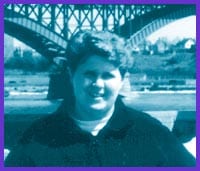She’s a storm chaser.
As a meteorology student, Emily Freeman and her classmates would track brewing tornados using radar and computers. Then they’d go out in the fields, “[try] to get in from of the storms, and see what they were doing.
“It really puts you in your place as a human,” says Freeman, 25, who was born and raised in South Carolina. “I can’t tell you a more humbling experience than to go out in a tornado.”
All through high school and into college, Freeman thought storm chasing would be her full-time occupation. A reserve officer in the United States military, the army was paying for her to study meteorology, and she planned to work with them when she graduated.
Until the pain.
Freeman began to experience unbelievable burning pelvic pain that seemed to be in sync with her menstrual cycle. Disabled for two weeks out of every month, she had surgery in December 1994 that confirmed what her doctors had suspected: endometriosis, an inflammation of the pelvic and uterine lining. Her first doctor told her to go on the birth control pill to suppress the symptoms. Two years later, the pain came back.
The whole experience led Freeman to her new calling. Now she’s a PhD student at McMaster University in Hamilton, examining how the health system treats women, especially lesbians. From her own experience, Freeman says women often get treated more like case studies than people.
“Being a lesbian means even more problems with the health system, especially in terms of reproductive issues,” she says. For years she was told the only solution to her problems was a hysterectomy – a decision she didn’t want to face at age 19. “It was assumed I didn’t want to have children because I was a lesbian.”
After much searching, Freeman finally found a good doctor through the Internet. Travelling from her home in South Carolina to his base in Atlanta, Georgia, she was lucky enough to be treated by one of only two doctors in the US who do effective work on endometriosis. In 1997, her second surgery excised the disease – and today she says “life is very nice.”
The purpose of her work at Mac is to see how women with reproductive trouble are treated in the health system and find ways to make the situation better. “[My doctor] treated me as a person, walked me through the disease, educated me,” she says. “I want to replicate that experience for other women.”
She came to Mac because of its high reputation for health sciences, and now says she hopes to stay in Canada after graduating. “I like the climate here – the social climate that is,” she laughs. It’s a lot easier here to include lesbians in her study, too.
The only snag might have been the reluctance of her partner of three years, who’s at Kent State. Freeman was working on convincing her to come up here – with phone calls and five hour drives. But the relationship collapsed in July. “The distance became too much.”
Freeman says one thing she does miss is the annual storm season down south. After all, there’s nothing like a good tornado.

 Why you can trust Xtra
Why you can trust Xtra


